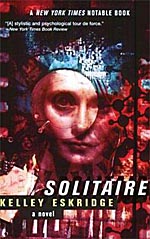
![]() Triseult
Triseult
3/24/2012
![]()
What happens when you isolate a human being from any contact with others for a number of years? What kind of deep scars will this leave on his or her psyche? How can she or he hope to ever live a normal life again?
These are some of the questions posed by the touching novel Solitaire, but don't think it's a grim, depressing story. At its heart is an emotional, uplifting story of inner strength and, dare I say it, love. It's cerebral SF of a breed rarely seen nowadays, and it's an amazing debut by Kelley Eskridge.
The main character of Solitaire is Jackal, one of many children called "Hopes", chosen as symbols of a new era of peace and prosperity, and destined to rule and perform in a number of high-profile roles. Jackal is a strong, young woman, but she is possessed of some doubts about her legitimacy as a Hope. The first part of the novel focuses on Jackal's life in Ko Corporation, and introduces a number of interesting secondary characters. Most importantly, we meet Snow, Jackal's girlfriend, and we are treated to a rare sight in SF: an homosexual relationship that is treated matter-of-factly, without any point dragged out of it.
The novel takes a dramatic turn, however, when Jackal finds herself condemned for an accident that killed hundreds of people. She is sentenced to a prototype technology, meant to rehabilitate convicts quickly: Virtual Confinement, or VC. In VC, 8 years will go by while Jackal is trapped in a small room without any escape or interaction with the outside world. In the real world, only 8 months go by.
That part of the novel is interesting, but the heart of the narrative is about what happens when Jackal comes out. The second half of the novel focuses on Jackal's new life, and the deep trauma that VC has dealt her. I really don't want to spoil it further. It's an intimate, touching story of survival and rehabilitation, and it alternates between scenes of great poignancy, and moments of thought-provoking speculation.
Solitaire is clearly a case of well-written feminine SF, something I always find to be refreshing and interesting as a guy. Eskridge spends more time studying the effects of her future technology and society on individuals, than she does on explaining technical minutiae, which should always be the point of SF, in my opinion. The core of Solitaire is about people, and actually about love and healing. It's flawed, complex love, too, not the kind of papering usually seen in SF romance novels such as Lois McMaster Bujold's Miles Vorkosigan series.
Solitaire suffers from being too short, actually; it feels like Eskridge could have spent more time detailing Virtual Confinement, or show us Jackal's life after VC over a longer period. However, Solitaire is a touching, thought-provoking first novel, and the best SF novel I read in 2004.